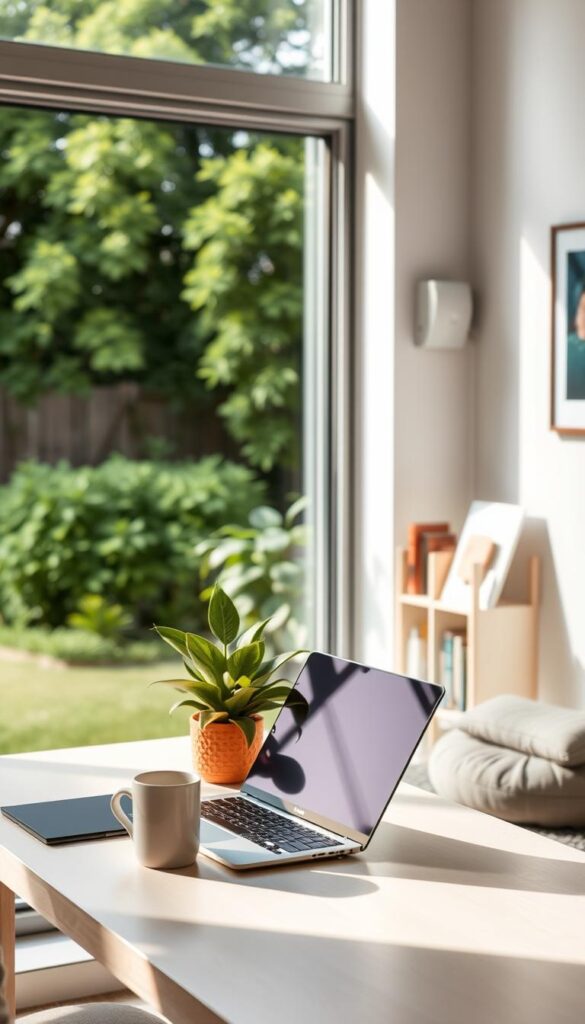Did you know 40% of remote workers feel isolated? This affects their drive and productivity. Remote work offers flexibility but brings challenges. It blurs the line between work and personal life for 30% of workers.
This can lead to long hours, stress, and less personal time. It shows we need tips to balance work and life better.
Remote work lets you create days that mix work and fun. Achieving work-life balance is key for health, happiness, and productivity. Feeling pressured to be always on can harm well-being and productivity by 25%.
Using the Pomodoro Technique can improve focus by 20%. This shows we can improve our balance if we try.
Starting a healthy routine can boost focus and energy. Taking breaks can make 70% of remote workers more productive. Social interaction, even online, can cut isolation in half and boost motivation.
But, remote work life has its challenges. We need strategies to draw clear lines and take back our time.
Key Takeaways
- Understanding the challenges of remote work life is key for balance.
- Structured breaks can greatly improve productivity.
- Social interaction fights isolation and keeps motivation high.
- Regular exercise and sleep are essential for focus and energy.
- Mindful techniques like the Pomodoro can make work hours more efficient.
- Setting boundaries keeps work from taking over personal time and reduces stress.
Understanding the Importance of Work-Life Balance in Remote Work
Remote work is changing how we work. Finding remote work-life harmony is key. It’s not just about time management. It’s about making your life happy and productive.
Getting remote work-life management right boosts your work and life. It lowers stress and makes you feel in control. But, a bad balance can cause burnout and lower your work quality. Studies show that good habits like sleep and exercise can make you 25% more focused.

Remote work-life balance means spending equal time on work and personal life. It’s important for staying productive. For example, the Pomodoro Technique can make you up to 30% more efficient. Setting clear boundaries is also key to avoid overworking.
The Psychological Effects of Poor Work-Life Balance
Poor work-life balance hurts your mind. About 43% of remote workers feel lonely and lose motivation. Being always on call also leads to mental tiredness and less job happiness. Setting clear work hours and taking breaks can help a lot.
Why Remote Workers Are at a Higher Risk
Remote workers often mix work and personal life too much. While 58.3% work from home better, many work too much. Setting strong boundaries and following a routine is important to avoid burnout.
Learning to balance work and life in remote jobs is vital. It improves your job and personal life. By using these tips, you can stay well and work well in a remote job.
Strategies for Achieving Work-Life Harmony as a Remote Worker
Working from home is a big challenge. It’s important to find the right balance. You need to set priorities, schedule your day, and follow tips for a good work-life balance.
Start by making a special work area at. This helps you focus on work without mixing it with personal time. It makes you more productive and less stressed.
Setting and Maintaining Clear Work Boundaries
It’s key to have clear work hours and rules. This helps you keep work and personal life separate. Rules like no work emails after hours make your personal time better.
Mastering the Art of Scheduling for Flexibility
Being flexible with your schedule is important. Use tools to plan your day. This way, you can work when you’re most focused. It makes you happier and more productive.

Also, a good company culture helps. It makes everyone happier and more productive. Happy teams do better work.
In short, good planning, a special work area, and clear rules are key. They help you balance work and life well. Follow these tips to enjoy the benefits of remote work and stay happy and productive.
Work-Life Balance in Remote Work – “Work-Life Balance Tips for Remote Workers (S
Remote work wellness is key today. More people want remote work-life balance tips to live better. It’s not just about separating work and life. It’s about mixing them to help you feel good.
Some stats show interesting facts about remote work. 42% of remote workers are very happy with their work-life balance. This shows that the right tips can make you happy and productive. Companies like The Remote Company help by giving new parents lots of time off and money.

Remote work lets you manage your time well. Some people work best in the morning, others at night. Working when you’re most productive can make you better at work and life.
Tools like task management and routines are very helpful. Remote workers with routines feel better about their balance. Simple habits, like setting work hours and taking breaks, help your mind and work.
Knowing how to use these tips can make remote work better. It lets you grow in work and life. As more people work remotely, using these strategies will help create a great work culture from anywhere.
Remote Work Productivity Tips for Maintaining Work-Life Integration
Working from home needs a good balance between work and personal life. New tools help you work better and connect with your team. Technology, mindfulness, and exercise can make your remote job better.
Using tech is key for daily tasks. Tools for talking and meetings keep things clear and connected. They help you stay focused and work well with others.
Being mindful at work is also important. Taking breaks and doing relaxing activities helps you stay focused and happy. It’s good for your mind and body.
Exercise is very important for working from home. It keeps you healthy and helps you think clearly. You can find tips to stay healthy at work here.
To make your remote job better, try these tips:
- Get good tools to help you work and talk to your team.
- Set clear work hours to avoid working too much.
- Make time for exercise to keep your body and mind fresh.

Using these tips can make you work better and feel good. It helps you have a healthy and happy remote job.
Conclusion
Remote work is changing how we work. More people might work from home by 2025. To find balance, we need to plan our days well and set clear work boundaries.
Working from home has its ups and downs. It can save time and make us happier. But, it can also make us feel lonely or overworked.
We can use technology to help us work better. But, we also need to remember to take care of ourselves. Working from home should be a chance to live a better life, not just work more.


